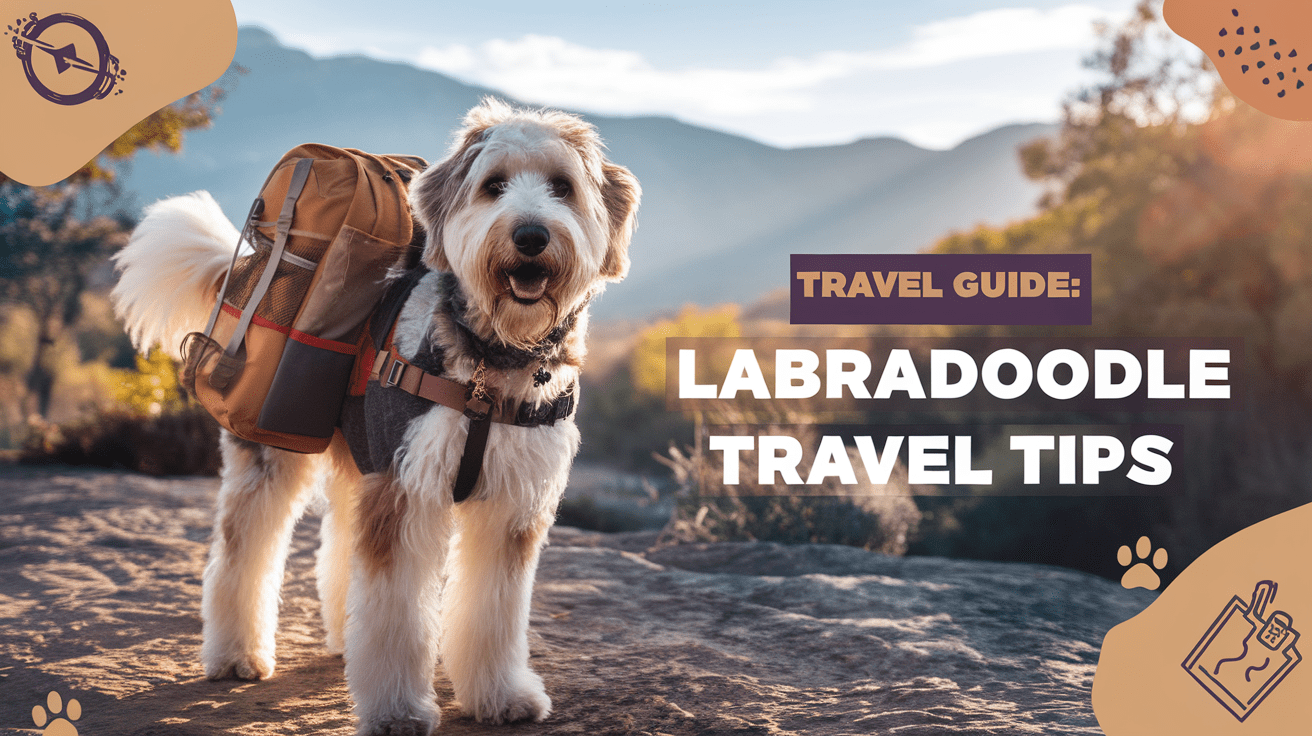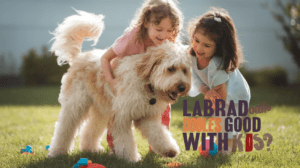Travel with Labradoodle Key Takeaways
- ✓ Pre-Travel Preparation: Ensure vaccinations are current and obtain a health certificate within 10 days of travel. Pack a dedicated travel kit with essential supplies.
- ✓ Air Travel Guidelines: Research airline-specific pet policies, book direct flights when possible, and arrive at least 3 hours early for international flights.
- ✓ Road Trip Success: Use proper safety equipment, plan rest stops every 2-3 hours, and create a comfortable space in your vehicle.
- ✓ Anxiety Management: Practice with short trips beforehand, maintain familiar routines, and consult your vet about motion sickness if needed.
Planning to travel with your Labradoodle? As a veterinarian who’s helped countless Labradoodle owners navigate travel challenges, I can tell you it’s absolutely doable – and can be incredibly rewarding! According to the Airlines for America, over 2 million pets travel by air annually, and our furry companions are increasingly becoming part of our travel adventures.
Labradoodles, with their friendly temperament and adaptable nature, make excellent travel companions. However, successful trips require proper preparation and understanding of your dog’s needs. Whether you’re planning a cross-country road trip or a quick weekend getaway, this comprehensive guide will walk you through everything you need to know about traveling with your Labradoodle – from essential preparations to finding pet-friendly accommodations.
After treating numerous travel-related issues in my clinic, I’ve learned that the key to stress-free travel with your Labradoodle lies in thorough preparation and understanding your pet’s unique needs. Let’s dive into making your adventures together both safe and enjoyable!
Preparing Your Labradoodle for Travel
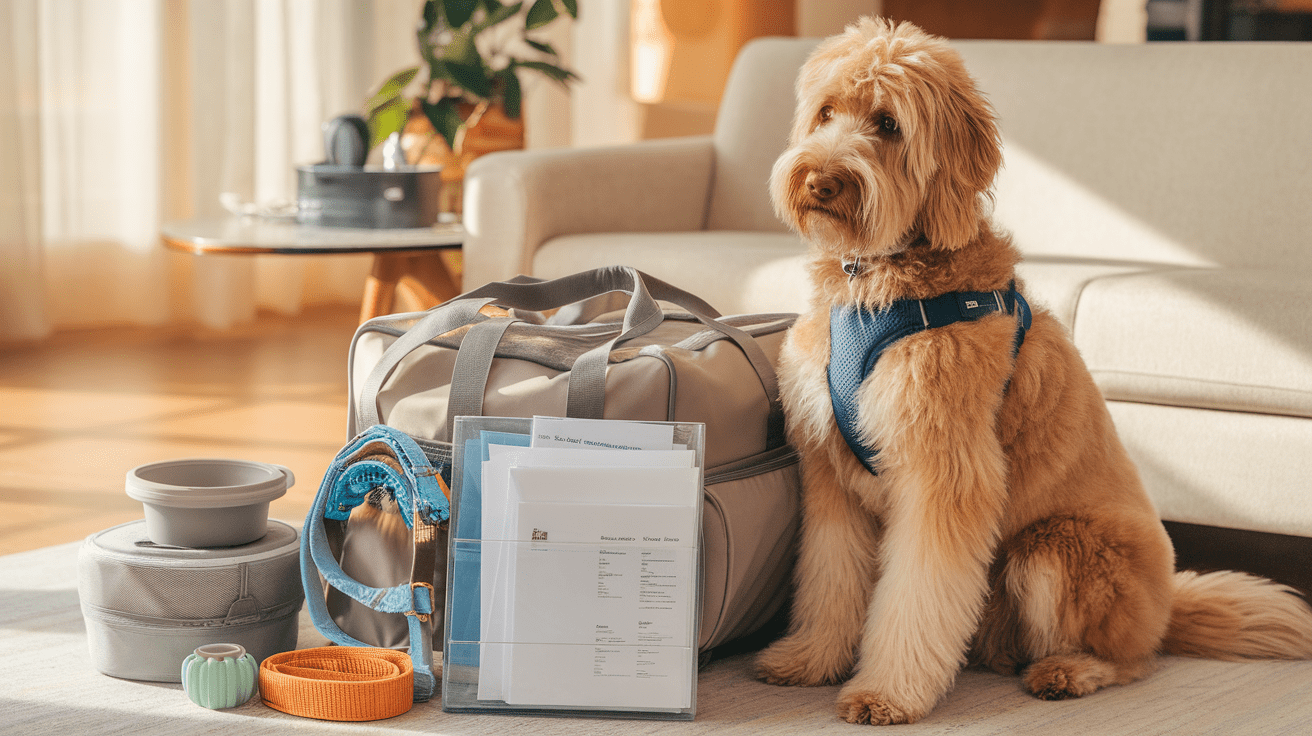
Proper preparation is the cornerstone of successful travel with your Labradoodle. In my veterinary practice, I’ve seen how well-prepared pets have significantly better travel experiences than those rushed into journeys. According to the American Veterinary Medical Association, 85% of pet travel issues could be prevented with adequate preparation.
Required vaccinations and health certificates
Before embarking on any journey, ensure your Labradoodle’s vaccinations are up-to-date. Core vaccines include:
• Rabies
• DHPP (Distemper, Hepatitis, Parvovirus, Parainfluenza)
• Bordetella (especially for air travel)
Request a health certificate from your veterinarian within 10 days of travel. I recently helped a client whose Labradoodle was denied boarding because their health certificate had expired – don’t let this happen to you!
Training and socialization before the trip
Think of travel preparation like training for a marathon – it requires consistent practice. Focus on these essential commands:
• “Stay” – crucial for busy airports and rest stops
• “Come” – vital for off-leash areas
• “Settle” – helps your Labradoodle remain calm in new environments
Expose your Labradoodle to travel-like situations. Practice with short car rides, visiting busy places, and staying in different environments. This gradual exposure builds confidence and reduces anxiety.
Essential gear and supplies checklist
Pack a dedicated travel kit for your Labradoodle including:
• Food and water bowls (collapsible ones save space)
• Regular food (switching diets during travel can cause digestive issues)
• Medications and first-aid supplies
• Familiar bedding and toys
• Waste bags and cleaning supplies
• Current ID tags and medical records
Remember the “comfort item rule” – pack something that smells like home, such as their favorite blanket or toy. Just last month, I saw how a client’s Labradoodle remained calm throughout a cross-country move simply because they had their familiar bed with them.
Air Travel with Your Labradoodle
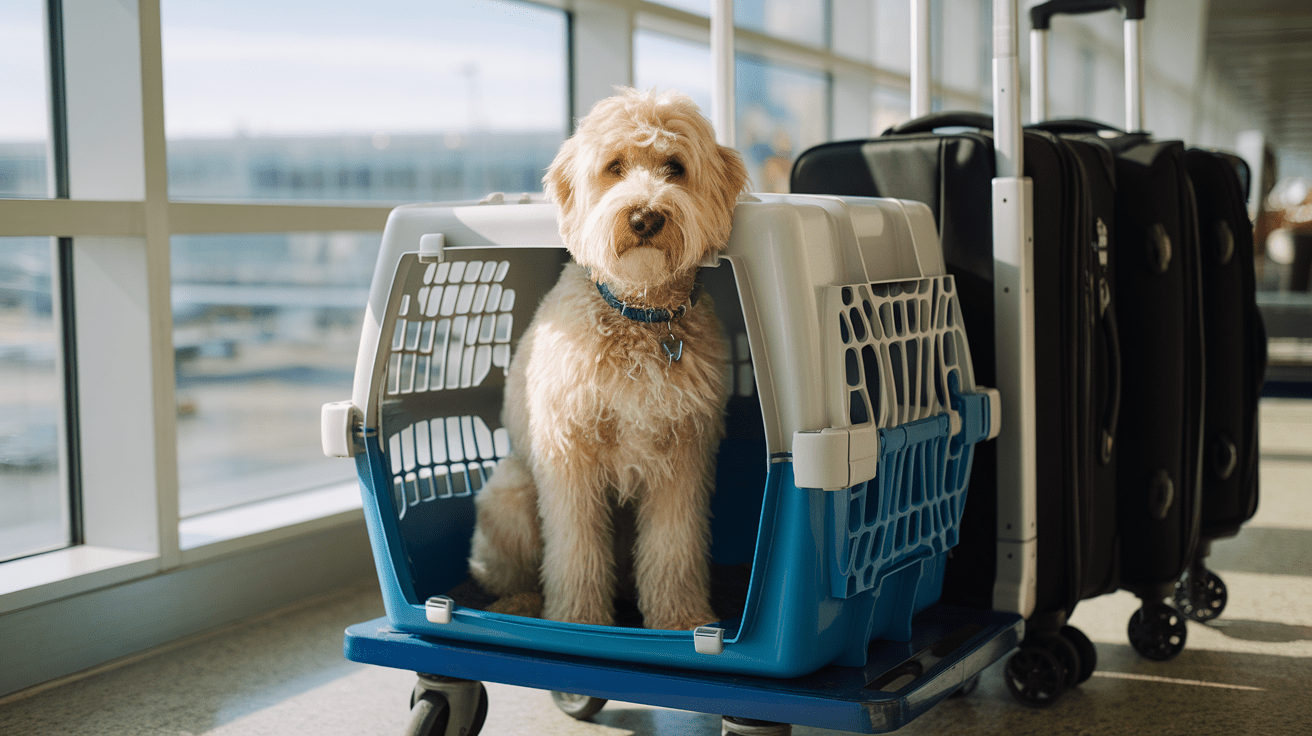
Flying with your Labradoodle requires careful planning and attention to detail. According to the U.S. Department of Transportation, over 400,000 pets travel safely by air each year, but proper preparation is crucial for a smooth journey.
Airline regulations and restrictions
Every airline has its own pet travel policies. Common requirements include:
• Current health certificate (usually within 10 days of travel)
• Proof of vaccinations
• Appropriate carrier size and type
• Temperature restrictions (many airlines won’t transport pets if temperatures are extreme)
I always tell my clients to treat airline research like planning a medical procedure – thoroughness is essential. Book direct flights when possible to minimize stress and handling time. Remember to confirm your pet’s reservation separately, as most airlines limit the number of pets per flight.
Choosing between cabin or cargo transport
Your Labradoodle’s size typically determines whether they can travel in-cabin or must go as cargo. Standard-sized Labradoodles usually exceed the in-cabin size limits. If your dog must travel as cargo, choose climate-controlled pet cargo services.
Last summer, I helped a client prepare their Mini Labradoodle for their first in-cabin flight. We worked on crate training for weeks, making the carrier a comfortable safe space. The result? Their pup slept through most of the flight!
Tips for stress-free airport navigation
Navigate airports with your Labradoodle like a pro by:
• Arriving at least 3 hours early for international flights
• Locating pet relief areas beforehand
• Using a collapsible water bowl for quick drinks
• Keeping leash, collar, and ID tags secure
Think of airport navigation as a choreographed dance – timing and coordination are everything. Exercise your Labradoodle well before the flight, but avoid feeding them for 4-6 hours prior to prevent motion sickness. I recommend bringing an empty water bottle through security that you can fill once inside for your pet’s hydration needs.
Road Trip Adventures with Your Labradoodle

Road trips with your Labradoodle can be an incredible bonding experience! According to the ASPCA, 78% of dog owners report that their pets enjoy car travel when properly acclimated. In my practice, I’ve seen how road trips can strengthen the human-animal bond while creating lasting memories.
Car safety equipment and setup
Your vehicle should be a safe haven for your Labradoodle. Essential safety equipment includes:
• Crash-tested car harness or carrier
• Non-slip seat covers
• Window shades for temperature control
• Secured water bowl
I recently worked with a family whose Labradoodle was initially anxious in cars. We created a “comfort zone” in their SUV with familiar bedding and toys. Within weeks, their pup was eagerly hopping into the car for adventures!
Planning rest stops and exercise breaks
Think of rest stops like pit stops in a race – they’re essential for success. Plan breaks every 2-3 hours for:
• Bathroom breaks
• Physical exercise and mental stimulation
• Water and small snacks
• Brief training sessions
Research pet-friendly rest areas along your route beforehand. I always recommend my clients use apps that locate dog parks and walking trails near highways. Remember, a tired Labradoodle is typically a calmer travel companion!
Managing motion sickness and anxiety
Just like humans, some Labradoodles experience travel anxiety or motion sickness. Help prevent these issues by:
• Feeding small meals 3-4 hours before travel
• Ensuring good ventilation
• Using calming aids like natural supplements or anxiety wraps
• Taking short practice trips before long journeys
For severe cases, consult your veterinarian about motion sickness medications. I’ve found that gradual exposure therapy – starting with 5-minute car rides and slowly increasing duration – works wonders for building confidence. Remember to always keep the car temperature comfortable and avoid sudden stops or sharp turns that might upset your pup’s stomach.
Finding Pet-Friendly Accommodations
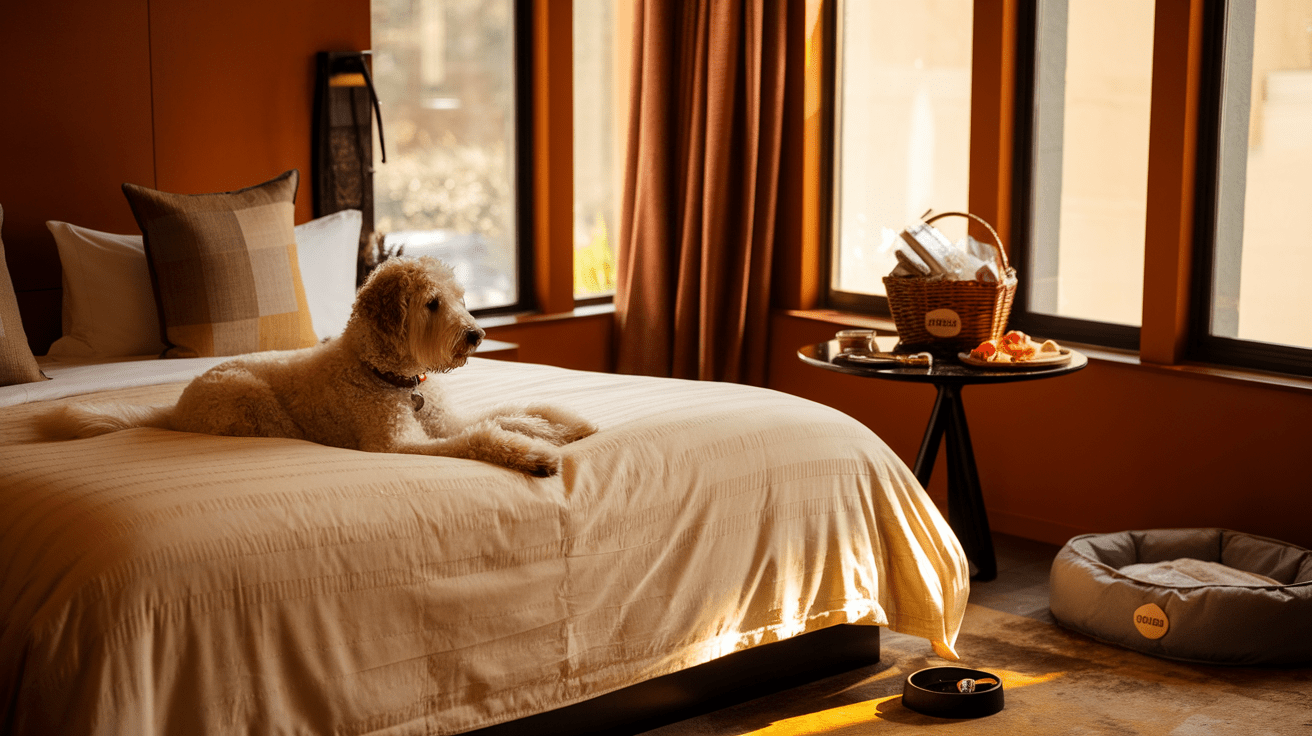
Finding the right accommodation for you and your Labradoodle can make or break your travel experience. According to Booking.com’s Pet Travel Report, 77% of pet owners have faced challenges finding suitable pet-friendly lodging. As someone who frequently advises pet owners on travel logistics, I’ve learned that advance planning is crucial.
Hotels and resorts that welcome Labradoodles
When searching for pet-friendly hotels, look beyond the “pets allowed” label. Consider these factors:
• Pet fees and deposits
• Size and breed restrictions
• Designated pet relief areas
• Proximity to emergency vet services
Just last month, I helped a client plan their cross-country move. They found a hotel chain that not only welcomed their Labradoodle but provided special amenities like pet beds and welcome treats. The key was calling ahead to discuss specific pet policies and room locations.
Vacation rental considerations
Vacation rentals often provide more space and flexibility for Labradoodles. When booking, ensure you:
• Get pet approval in writing
• Understand the pet cleaning fees
• Check yard security and fencing
• Review neighborhood pet restrictions
Think of vacation rentals like finding a temporary home – you need to consider both comfort and practicality. I always recommend taking photos of the property upon arrival to document its condition and protect your security deposit.
Camping and outdoor lodging options
Camping can be an excellent option for adventure-loving Labradoodles. However, success requires preparation:
• Research pet policies at campgrounds
• Pack appropriate outdoor gear
• Consider weather conditions
• Bring protective equipment like tick repellent
From my experience treating camping-related issues, I’ve found that Labradoodles generally excel in outdoor settings. However, always check local wildlife advisories and keep your dog leashed in unfamiliar areas. One of my clients created a special “camping kit” for their Labradoodle, including a portable bed, cooling mat, and first-aid supplies – it’s now their go-to packing list for outdoor adventures.
Preventive Care and Management
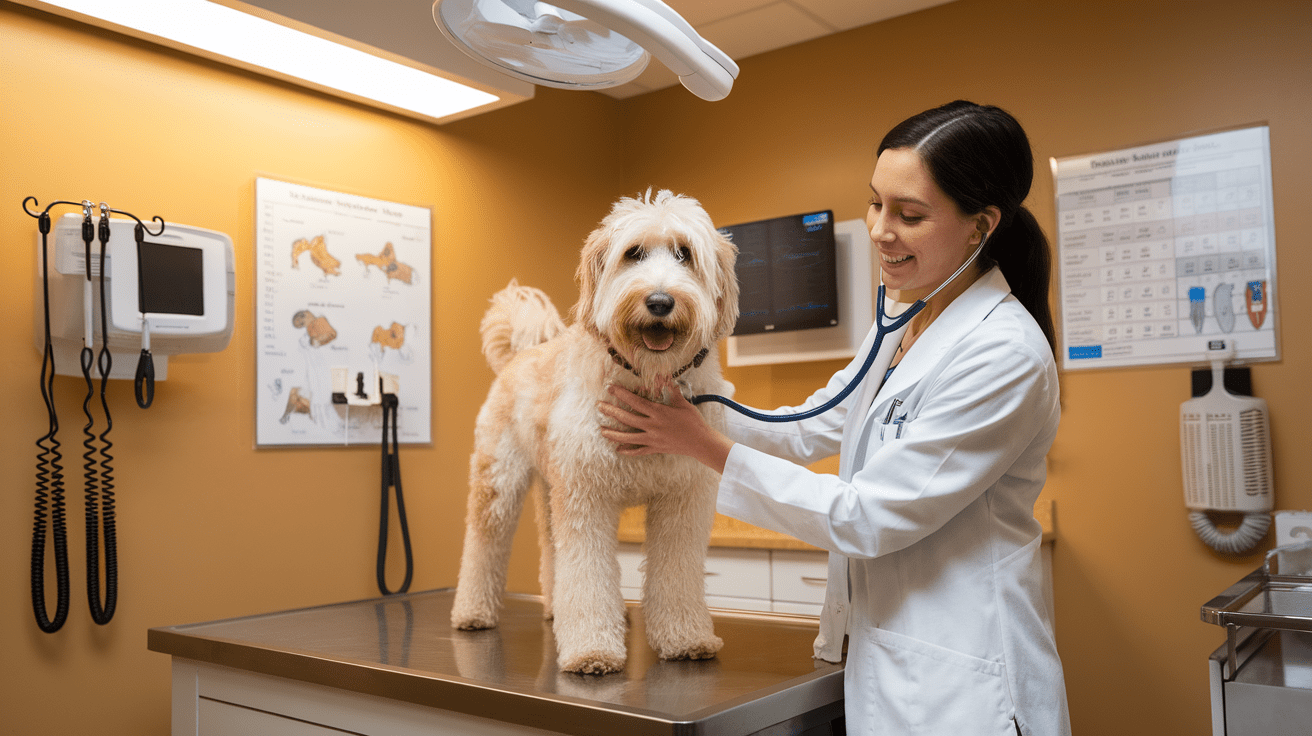
Preventive care is the cornerstone of maintaining your Labradoodle’s health throughout their life. According to a study by the American Veterinary Medical Association, dogs receiving regular preventive care live an average of 2.5 years longer than those who don’t. During my years at the clinic, I’ve seen how consistent preventive care can make a remarkable difference in a Labradoodle’s quality of life.
Recommended Vaccination Schedule
Think of vaccinations as your Labradoodle’s shield against serious diseases. Just like installing security systems in your home, vaccines provide essential protection. I always develop customized vaccination schedules based on each dog’s lifestyle and risk factors.
Core vaccinations include:
• Distemper, Parvovirus, Adenovirus (DAP): Every 3 years after initial series
• Rabies: As required by law
• Bordetella: Annually for social dogs
• Leptospirosis: Annually in at-risk areas
Diet and Exercise Requirements
A balanced diet and proper exercise are fundamental to your Labradoodle’s health. I often compare it to maintaining a car – the right fuel and regular movement keep everything running smoothly. Recently, I worked with a Labradoodle named Bailey who transformed from being overweight to achieving optimal health through a tailored diet and exercise plan.
Key dietary and exercise guidelines:
• High-quality protein-rich food appropriate for age and activity level
• 60-90 minutes of daily exercise
• Mental stimulation through interactive play
• Regular weight monitoring
Regular Health Screening Timeline
Routine health screenings are like regular check-ups for your car – they help catch potential issues before they become serious problems. I recommend a comprehensive screening schedule that adapts as your Labradoodle ages.
Recommended screening schedule:
• Puppies: Monthly checks until 6 months
• Adults (1-7 years): Annual comprehensive exams
• Seniors (8+ years): Bi-annual check-ups with blood work
• Dental evaluations: Every 6-12 months
Remember, preventive care is always more effective – and usually less expensive – than treating conditions after they develop. By following these guidelines and maintaining regular communication with your veterinarian, you can help ensure your Labradoodle lives a long, healthy, and happy life. Every Labradoodle is unique, so don’t hesitate to discuss adjustments to these recommendations based on your dog’s specific needs.
Frequently Asked Questions About Traveling with Labradoodles
Conclusion
Traveling with your Labradoodle can be an incredibly enriching experience when approached with proper planning and preparation. Remember that each journey is unique, just like your furry companion. By following the comprehensive guidelines outlined in this guide – from health preparations to accommodation considerations – you’re setting yourself up for successful adventures together. As a veterinarian, I’ve witnessed countless successful trips that have strengthened the bond between Labradoodles and their owners. The key is to remain flexible and patient while always prioritizing your pet’s wellbeing. Whether you’re planning a cross-country road trip or a quick weekend getaway, remember that the goal is to create joyful memories together. With thoughtful preparation and a positive attitude, you and your Labradoodle can explore the world as the perfect travel team!
Before embarking on any travel adventures with your Labradoodle, ensuring they’re well-trained is crucial for a smooth journey. Our comprehensive Labradoodle Training Guide covers essential commands and behaviors that will make your travel experiences more enjoyable. From mastering basic obedience to developing crucial socialization skills, this resource will help prepare your Labradoodle for any travel situation, whether it’s a quick car ride or an extended vacation.

